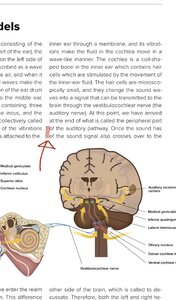- Oct 24, 2017
- 858
- Tinnitus Since
- 10/2017
- Cause of Tinnitus
- one-sided hearing loss (of unknown origin)
Where does tinnitus come from?
Most of you might know that the triggers for tinnitus lie in both the ear and the brain, and that hearing loss is one of the causes. But what are the exact mechanisms at play? Well, there's no one answer to that question, but we will try to give you the lay of the land.
How can you learn more?
Attached is the first version of a brochure that we worked on for the better part of 2021. In essence, the content provides you with an overview of the main current theories on how and where tinnitus originates.
Who is this for?
The aim is to provide you with a deeper dive than the currently available lay resources on this topic, which tend to be 'dumbed down' significantly. At the same time, we want to save you the effort of going 'down the rabbit hole' and spending dozens of hours reading tough academic papers (unless you want to do that of course ). The target audience is therefore curious lay people with a keen interest in the science behind tinnitus.
). The target audience is therefore curious lay people with a keen interest in the science behind tinnitus.
Who created this?
The content was created by two neuroscience PhD students, Tori and Kate (full accreditations below). We cannot stress enough how awesome these two people are for giving so much of their free time to this project! I (@Hazel) worked closely with them throughout the process. Our Patient Expert Panel, consisting of five knowledgeable and respected Tinnitus Talk members, provided feedback on the draft content. Finally, the content was validated by two senior tinnitus researchers.
Content Creators:
Is the content 100% final?
No. However much time you put into a resource like this, once it's published, we expect some of you will tell us about parts that are unclear, confusing, incomplete, or even incorrect. So, we will improve based on your feedback — please tell us what you think down below!
What else are we planning?
In future, we want Tinnitus Talk to be more than a forum. We aim to provide more educational resources, and house them on a separate section of the site. This will also allow us to use different formats, styles, and interactive tools to make the content more accessible and engaging.
Most of you might know that the triggers for tinnitus lie in both the ear and the brain, and that hearing loss is one of the causes. But what are the exact mechanisms at play? Well, there's no one answer to that question, but we will try to give you the lay of the land.
How can you learn more?
Attached is the first version of a brochure that we worked on for the better part of 2021. In essence, the content provides you with an overview of the main current theories on how and where tinnitus originates.
Who is this for?
The aim is to provide you with a deeper dive than the currently available lay resources on this topic, which tend to be 'dumbed down' significantly. At the same time, we want to save you the effort of going 'down the rabbit hole' and spending dozens of hours reading tough academic papers (unless you want to do that of course
 ). The target audience is therefore curious lay people with a keen interest in the science behind tinnitus.
). The target audience is therefore curious lay people with a keen interest in the science behind tinnitus.Who created this?
The content was created by two neuroscience PhD students, Tori and Kate (full accreditations below). We cannot stress enough how awesome these two people are for giving so much of their free time to this project! I (@Hazel) worked closely with them throughout the process. Our Patient Expert Panel, consisting of five knowledgeable and respected Tinnitus Talk members, provided feedback on the draft content. Finally, the content was validated by two senior tinnitus researchers.
Content Creators:
- Tori Kok - PhD student, University College London, Ear Institute, funded by National Institute for Health Research, Biomedical Research Centre (NIHR BRC)
- Kate Yukhnovich - PhD student, Newcastle University, funded by RNID and the Masonic Charitable Foundation
- Professor Raj Shekhawat, Flinders University
- Dr Will Sedley, Newcastle University
Is the content 100% final?
No. However much time you put into a resource like this, once it's published, we expect some of you will tell us about parts that are unclear, confusing, incomplete, or even incorrect. So, we will improve based on your feedback — please tell us what you think down below!
What else are we planning?
In future, we want Tinnitus Talk to be more than a forum. We aim to provide more educational resources, and house them on a separate section of the site. This will also allow us to use different formats, styles, and interactive tools to make the content more accessible and engaging.

 Director
Director Member
Member
